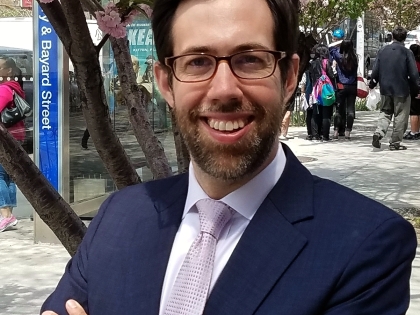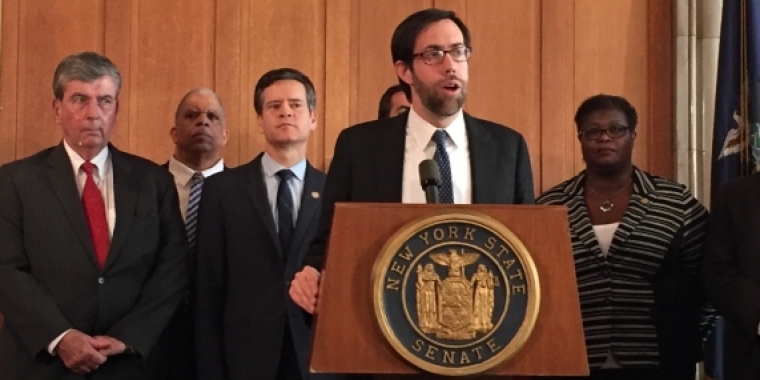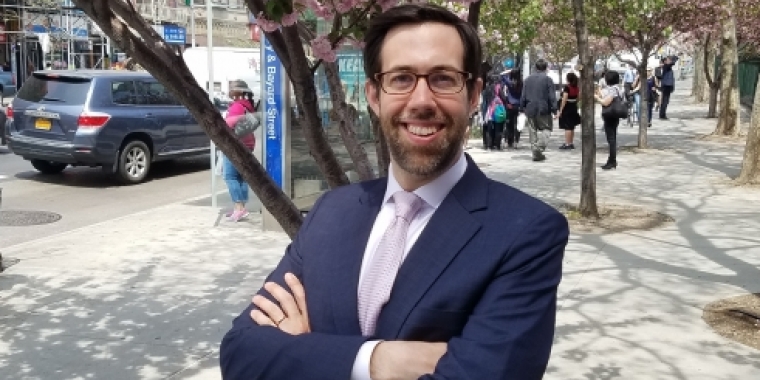
Quart, Squadron, Advocates Announce Bill Allowing Public Access to Police Body Camera Footage
August 6, 2015
-
ISSUE:
- Civil Rights
- New York City
- Police
Would Allow Public to FOIL Recorded Encounters Between Police and Citizens
NEW YORK –State Senator Daniel Squadron, Assemblymember Dan Quart, and advocates have announced a bill ensuring that police body camera recordings are publicly accessible under New York’s Freedom of Information Law (FOIL). This legislation will promote greater transparency in everyday encounters between police officers and members of public."
“As the NYPD expands its new body camera program, it’s vital that the footage from these cameras is not kept from the public,” said Assemblymember Dan Quart. “Citizens have a right to know what the police force is doing in their name. More importantly, citizens with a grievance against an officer should have access to the video footage that could prove their claim, and ensure that appropriate disciplinary action is taken.”
“Body cameras have broad support, and the potential to protect everyone involved. But, they only work if the information increases transparency and safeguards privacy,” said State Senator Daniel Squadron. “As body camera implementation continues, it’s important that current law keep up with new technology. I thank Assemblymember Quart, advocates, and my colleagues."
“Body cameras are neutral observers that protect officers and civilians alike and their implementation is a part of our collective efforts to restore the public's trust in law enforcement,” said Council Member Vanessa L. Gibson, Chair of the Committee on Public Safety. “Making body camera footage that has been available through a standard FOIL process furthers these efforts and ensures this new technology will be subject to the same regulations as other police records. I thank Senator Daniel Squadron and Assembly Member Dan Quart for bringing this important discussion forward and continuing the push for meaningful changes in law enforcement culture.”
“We support this bill as an important first step in the right direction toward rolling back Civil Rights Section 50-a’s unparalleled protection for police records,” said Justine Luongo, Attorney-in-Charge of the Criminal Defense Practice at Legal Aid.
“Body cameras can be a powerful tool for increasing police accountability, but they are only as effective as the policies governing their use,” said Johanna Miller, NYCLU Advocacy Director. “Privacy protections must be in place to ensure body cameras don’t become a tool for mass surveillance. At the same time, it is essential that victims of police misconduct and other parties with legitimate interests can access footage. This bill is an important step for balancing the interests of transparency and privacy, and we look forward to working with Senator Squadron and Assemblymember Quart to address these important issues.”
“The era of bodycams has arrived, and the recommendation by Senator Squadron and Assemblymember Quart offers a balanced approached to disclosure found in the NY Freedom of Information Law,” said Robert Freeman, Executive Director of the New York State Committee on Open Government. “FOIL protects personal privacy and the ability of law enforcement agencies to withhold records when disclosure would interfere with their functions or jeopardize public safety. The recommendation offered by Squadron and Quart would also guarantee disclosure and promote the public’s trust in those government employees who have the most power over peoples’ lives.”
“Under the current interpretation of Section 50-a, records concerning the conduct of law enforcement officers have been shielded from public scrutiny,” said Franklin Stone, Chair of the New York State Committee on Open Government. “The Committee on Open Government has recommended that the law be amended to promote accountability. The proposal offered by Senator Squadron and Assemblymember Quart would go a long way in the effort to achieve that goal.”
“Senator Squadron and Assemblymember Quart showed important leadership on police accountability by sponsoring this bill. Public access through New York’s Freedom of Information Law (FOIL) to the footage captured on body cameras is an important tool to increase transparency and accountability,” said Kassandra Frederique, New York Policy Manager at Drug Policy Alliance. “This is an important step, one that is part of a larger effort to make New York more fair and equitable. With the increasing demand for a new approach in this nation’s justice system, New York should lead the effort in bringing innovation to the criminal justice system. We hope the legislature will continue to take decisive action to increase transparency, accountability, and fairness in the New York criminal justice system and serve as a model for the nation.”
“Without public access to body camera footage, we severely limit the ability of body cameras to be a tool for real police accountability,” said Alyssa Aguilera, Political Director, VOCAL-NY. “The police cannot dictate when footage is released; instead there should be a fair process that protects privacy while also promoting transparency - this bill will do just that. Thank you to Senator Squadron and Assembly Member Quart for their leadership on this important issue.”
Section 50-a of New York’s Civil Rights Law states that personnel records are not subject to FOIL requests. According to the NYS Committee on Open Government, a broad interpretation of the current law could allow body camera recordings to be handled as personnel records. This legislation would ensure that body camera recordings should be subject to FOIL. In addition, today if recordings are released to the public, there is no statutory requirement that identifying features from police body cameras be redacted. The bill provides that identifying details of individuals in the recording, including facial features and voices, will be redacted. The bill further permits access under FOIL to metadata from video recordings, such as data regarding time and place. The bill also provides for use of original body camera recordings for purposes of discovery and personnel decisions, as provided under current law. It also maintains existing access to information and exemptions explicitly provided for under FOIL.
Share this Article or Press Release
Newsroom
Go to NewsroomSquadron Honors Local Students For Community Engagement
June 27, 2016


What Happened (And Didn't) in Albany
June 18, 2016

